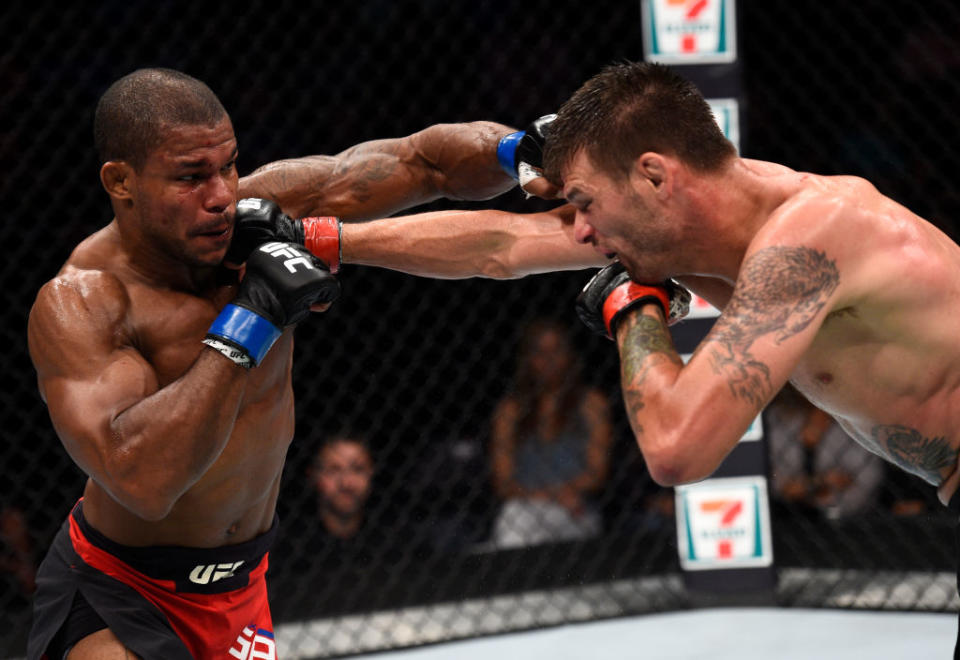Being shot, sent to prison and a false positive haven't stopped Tim Means

That Tim Means made himself a viable contender in the UFC’s welterweight division after surviving being shot in the leg and spending four years in prison is enough of a miracle in and of itself.
But Means, who fights Belal Muhammad on Saturday in one of the featured bouts on a UFC Fight Night card in Sydney, Australia, has also moved toward the top of the division after a failed drug test in 2016 that nearly ruined his career.
Like most fighters who are caught with performance-enhancing drugs in their system, Means cried foul and denied using any banned substances.
But unlike most fighters who lie through their teeth with their denials, Means was telling the truth.
And the United States Anti-Doping agency worked hand-in-hand with Means to establish his innocence.
Means tested positive for the banned substance Ostarine on Feb. 3, 2016. Means, who had won five of his previous six fights, would have moved his name into discussion for a title shot with a win over Donald Cerrone in a bout that was scheduled for Feb. 21, 2016.
Means denied the doping allegations and after providing a sealed container of a supplement he was taking, he was vindicated. An examination by a World Anti-Doping Agency-accredited laboratory in Salt Lake City discovered that his supplements were contaminated with Ostarine.
UFC vice president Jeff Novitzky helped educate Means on issues surrounding his positive test, and Means now takes supplements he knows are from credible sources. The supplements he takes are recommended to him by nutritionists at the UFC Performance Institute.
Means was able to accept what happened with USADA in part because of what he’s been through in his life.
“I was able to deal with [the positive test] and work through it because of my past,” Means said. “If you look at my past, I’ve been through some ups and downs. Some things happened to me in life that weren’t my fault, but a lot of things that happened were my fault. I just chalked it up and rolled with the tide.
“I’m happy that USADA found a pretty dangerous issue with one of my supplements. It could have turned out very bad health-wise for me if I had [continued to consume it]. I’m thankful to USADA and I’m thankful to Jeff Novitzky for getting on board and believing in me. Hats off to USADA for finding something that could have been dangerous to me health-wise, so high-five to those guys. I’m not one to make excuses. It happened, it’s in the past and so we move on.”
But it was not so simple to move on. He received a six-month suspension despite being innocent because the banned substance was in his body.
After a win over Sabah Homasi in his return to competition at UFC 202 that gave him six victories in his last seven fights, Means faced Alex Oliveira at UFC 207.
That was a significant card and a high-profile bout for Means, who at first thought he’d won by knockout when he kneed Oliveira, who couldn’t continue.
Referee Dan Miragliotta ruled it a no-contest. That set up a rematch, and Oliveira’s wrestling led him to a win. But in the first minute of the fight, Means rolled his ankle and wound up with a broken foot and a nerve contusion.
But he scored a unanimous decision over Alex Garcia in June to get back on the right track and put the issues of the prior 15 months behind him.
At 6-2, Means is a lanky fighter with a striking game similar to former UFC champion Carlos Condit. That is probably not so surprising since Condit began in MMA with coaches Tom Vaughn and Arlene Sanchez, the same coaches who have trained Means for 17 years, or more than half his life.
He began his MMA career in 2004, but it almost ended before it ever got going. That same year, when Means was 20, he was shot in the left leg when, after a night of drinking, he was accused of cutting in line at a fast-food restaurant. He was shot in the femoral artery on the left thigh and nearly bled to death.
He developed a drug habit after becoming addicted to morphine that he took to ease pain from the gunshot wound. Eventually, from morphine he graduated to methamphetamines.
Not long after, he was arrested on drug charges and spent four years in prison, from 2005 through 2009.
Means, 33, turned to fighting when he got out of prison because it was a way to support himself. Vaughn has become what Means calls “a cool-ass uncle” and said their relationship has made him the fighter he is.
Means admits he’s not crazy about fighting and didn’t get into the sport because he loved it. It was a way to put food on the table and he discovered he was good at it.
He’s the epitome of a tough guy who isn’t built like a tank but who has great motivation and an eagerness for the battle.
“I don’t have this cool, sexy-ass muscular physique,” Means said. “But dynamite comes in wiry packages. That’s what I’m about. If you look at Carlos Condit, we look a lot alike because our coaches are the exact same. My coaches are the same ones who created him before he moved to Jackson’s.
” … We have that old-school mentality. You have to get in there and suck it up and tough it up. But at the same time, science has gotten better for recovery, and we’ve gotten smarter over the years with this stuff. But you have a short window to do this stuff and I’m just trying to make the most of it while I can still do it.”

